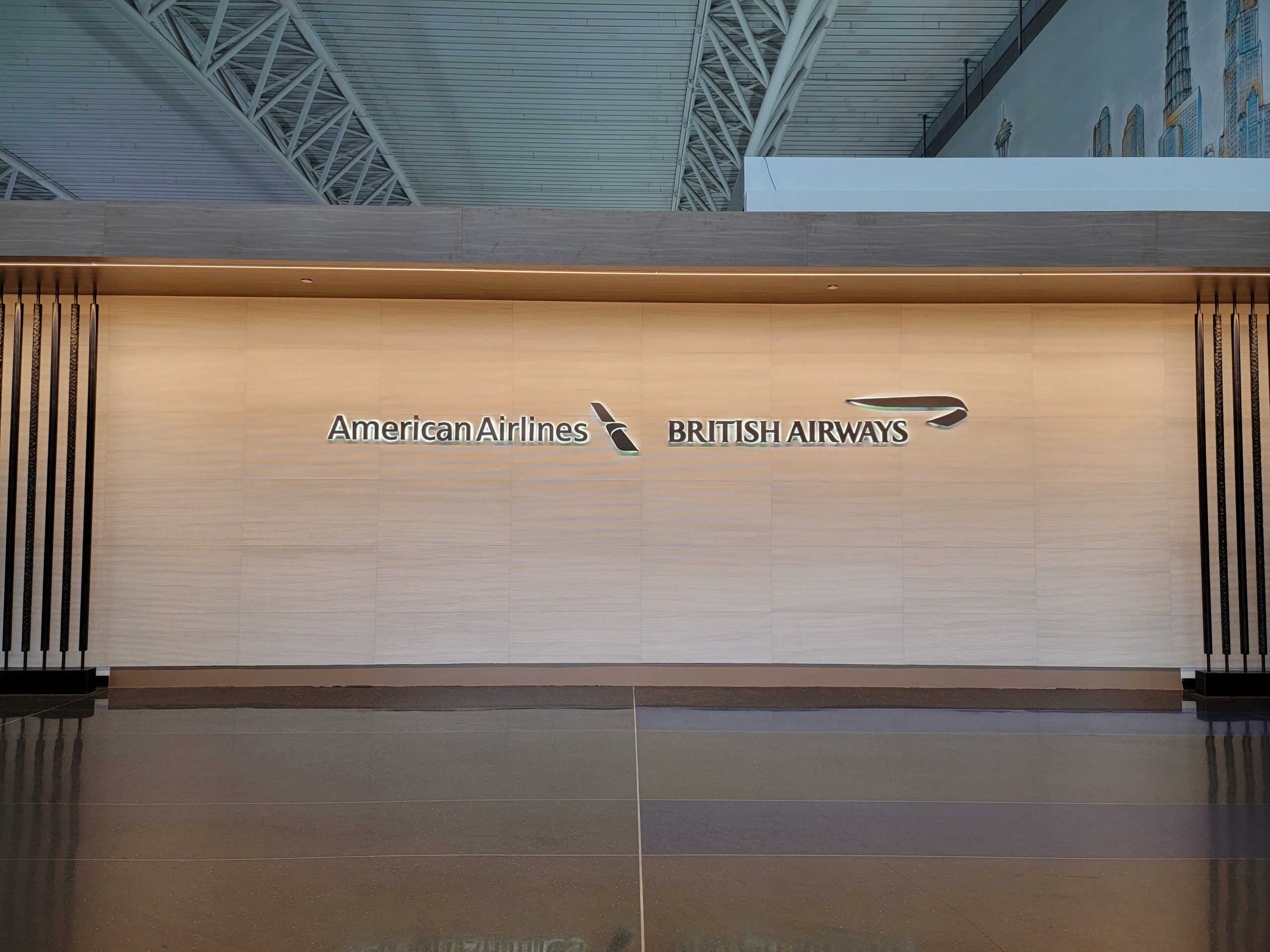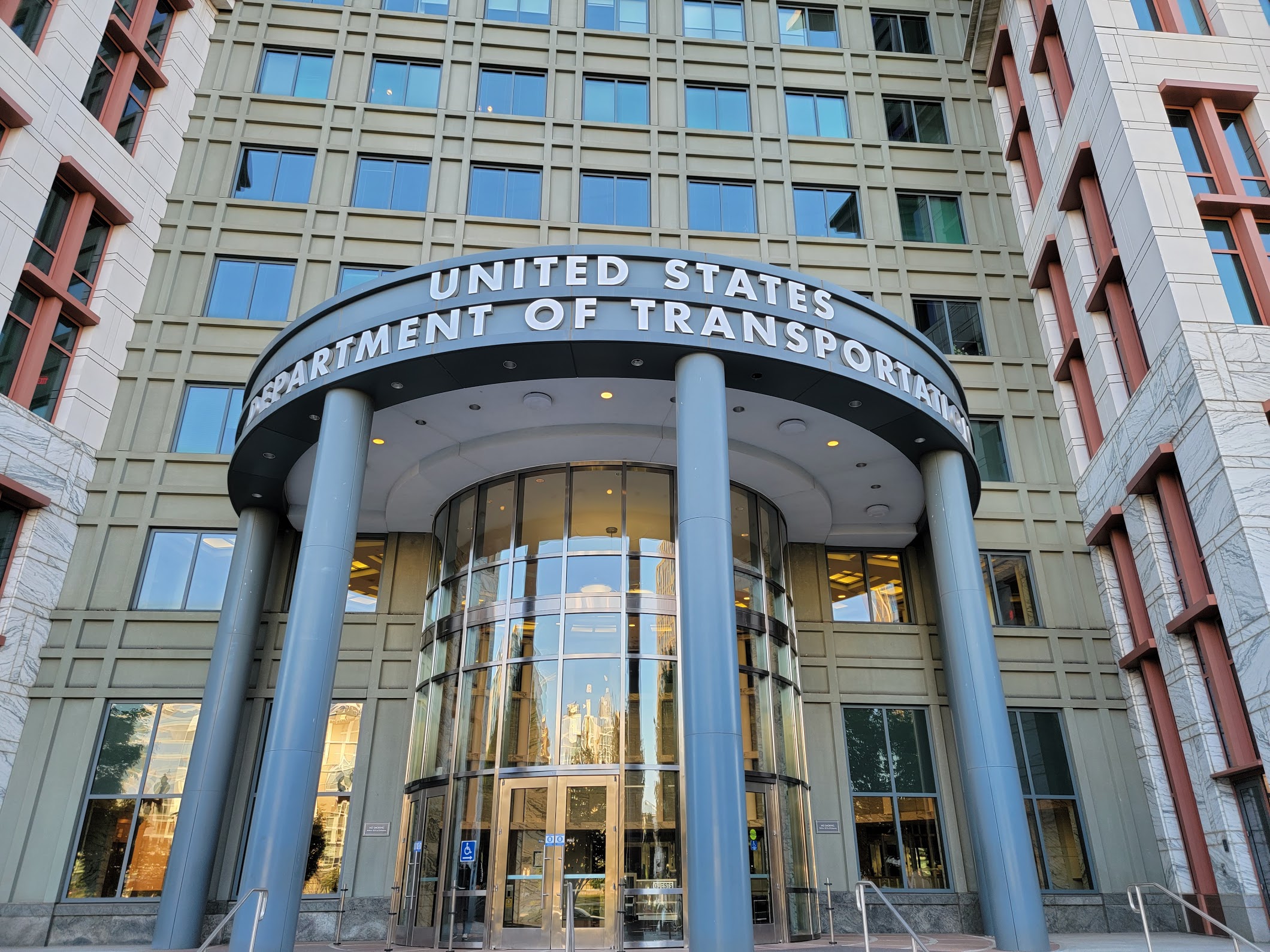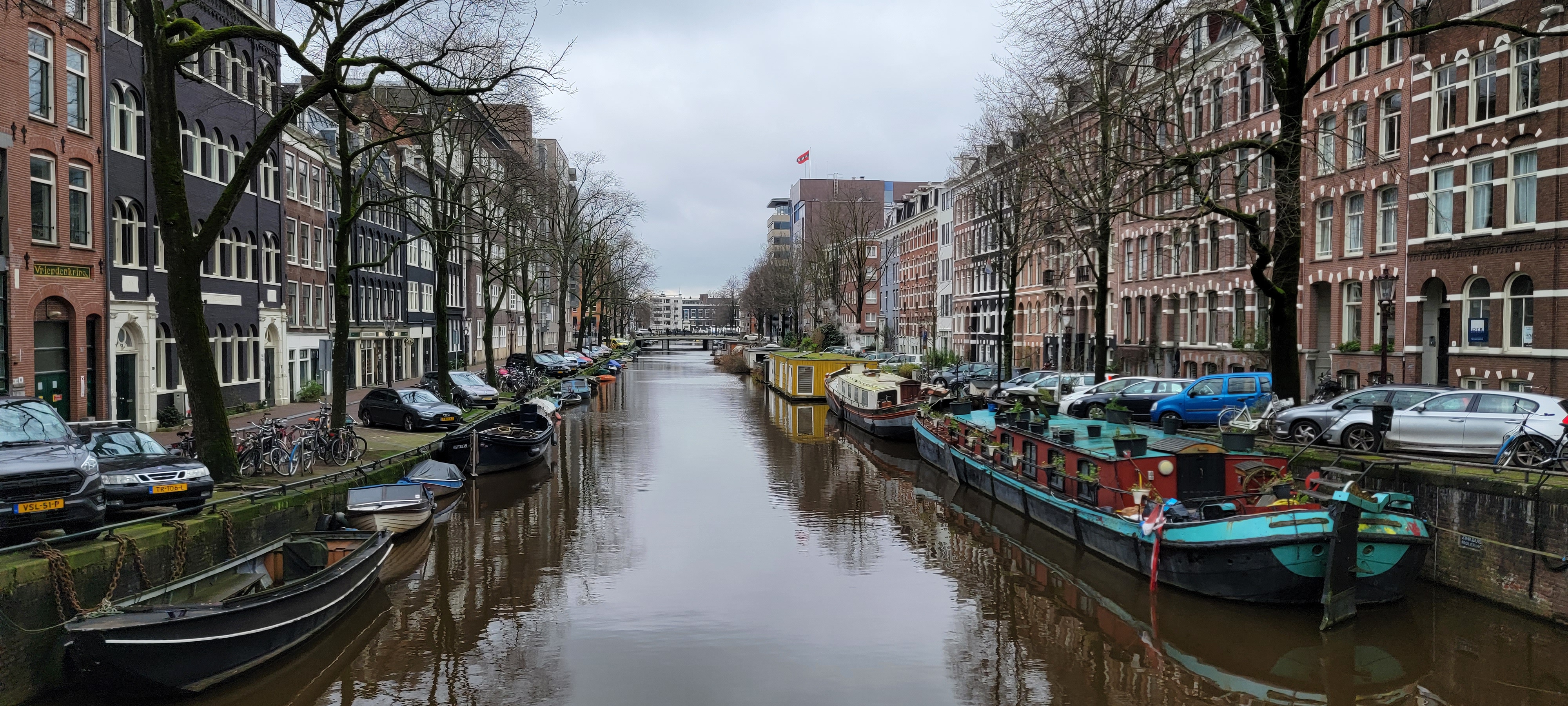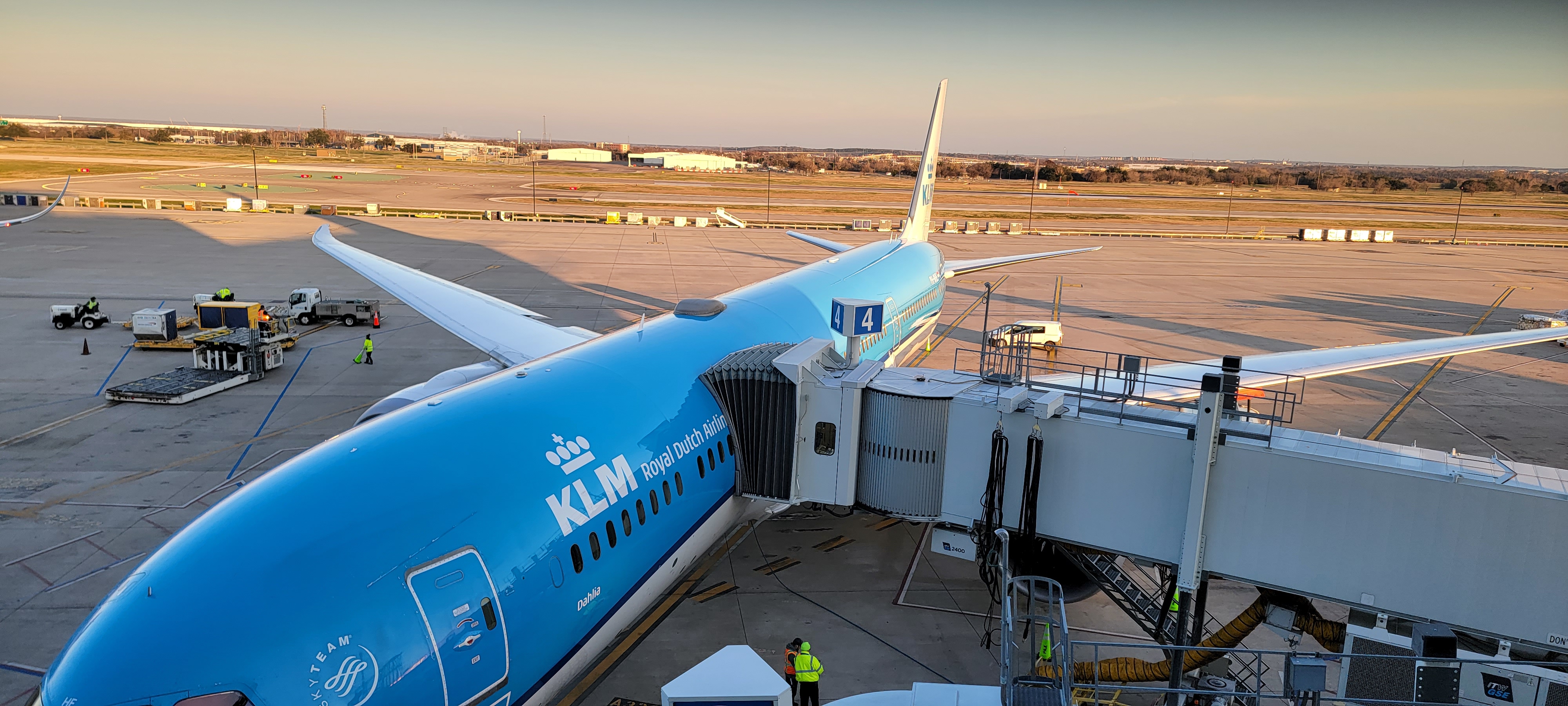U.S. and foreign airlines are granted anti-trust immunity all the time to collude on schedules and pricing, jointly deciding who will fly where and how much they’ll charge. The power the Department of Transportation has to allow this comes from an unusual, historical place, and its use has exploded in recent years. For instance,
- American, British Airways, Iberia, Finnair and Aer Lingus have a transatlantic joint venture, acting as though these airlines were a single company rather than competitors.
- United, Air Canada, Lufthansa, Austrian, Swiss, and Brussels Airlines are another joint venture across the Atlantic.
- Delta, Virgin, and Air France KLM have a joint venture
- So do Delta and Aeromexico, and Delta and Korean
- As well as United and ANA, American and Japan Airlines, and American and Qantas.

American Airlines-British Airways Premium Check-in, New York JFK
Though the Biden administration took a hard line on anti-trust, fighting to stop the JetBlue acquisition of Spirit Airlines and the JetBlue-American Airlines partnership, they had as lax an anti-trust record with joint ventures as past administrations. The idea that these exist at all is strange!
The Department of Transportation has the authority to waive these anti-trust concerns. They inherited it from the Civil Aeronautics Board when airlines were deregulated in 1978.

The Civil Aeronautics Board had the power to waive antitrust because,
- Airline regulation was designed to raise prices. It was meant to support airline profits. The argument went that airlines needed to be profitable to invest in safety.
- The CAB approved fares and schedules for domestic travel.
- And they waived anti-trust rules so that world airline association IATA could collude on fares for international travel.
And since DOT had this power, Northwest Airlines and KLM decided to ask them to use it. KLM had invested in Northwest, but their ownership stake was limited by law. They were also hamstrung in working together by anti-trust.

Amsterdam Schipol Airport
Several years ago, long-time KLM Vice President of Government Affairs Paul Mifsud told the story about getting the first anti-trust immunized joint venture between a U.S. and foreign airline approved.
KLM had a substantial equity stake in Northwest, but U.S. law limited foreign ownership of U.S. airlines. KLM acquired a 20% stake in Northwest Airlines in July 1989. That increased to 25% – the legal maximum – in 1994. Foreign ownership restrictions blocked a full corporate merger and made it difficult to coordinate routes and pricing without breaching antitrust laws.

Amsterdam
The Supreme Court’s decision in Copperweld v. Independence Tube Corp. (1984) held that a parent company and its wholly owned subsidiary are not capable of conspiring under the Sherman Act (i.e., they can be treated as a single firm for antitrust purposes). Northwest’s counsel Elliott Seiden and Mifsud realized that if KLM and Northwest could have merged fully, they would be treated as a single entity and thus not subject to antitrust restrictions.
The only legal obstacle to merging was the foreign ownership limit. Therefore, Mifsud and Seiden reasoned they could petition DOT to grant antitrust immunity to function “as if” they were one company—mimicking the scenario that would exist but for the ownership caps.
Mifsud presented the Copperweld rationale to Don Horn, a senior DOT attorney (Horn has been Assistant General Counsel for International Law since 1988). Horn concluded that if the foreign ownership barrier was effectively the only roadblock to a lawful merger, DOT had authority to grant antitrust immunity so the two carriers could operate jointly. The combined Northwest-KLM share of transatlantic traffic then was small, so there was little risk of them forming a monopoly. It wouldn’t have faced significant scrutiny had a merger been possible.

Around the same time, the U.S. was advocating Open Skies. Mifsud and others argued that if DOT granted Northwest-KLM immunity, and linked it to Open Skies, other countries would see the advantage and sign Open Skies deals of their own to get the same ATI benefits for their airlines.
Today, anti-trust immunity is considered only in cases where Open Skies treaties exist between an airline’s countries. Historically that wasn’t because of competition concerns – the linkage was a carrot to get such treaties in place, advancing a policy interest of the United States. The first-ever grant of antitrust immunity to an airline alliance accompanied the U.S.–Netherlands Open Skies Agreement in 1992.
With immunity, Northwest and KLM aligned flights, schedules, pricing, revenue management, and combined sales offices. They shared revenue and operated as a single transatlantic enterprise—what is now referred to as “metal neutral,” meaning it no longer mattered whose aircraft (“which metal”) a passenger flew.

KLM Delft Houses
Now, anti-trust immunity is granted even where the partners share a majority of traffic rights. It’s a substitute for mergers, and an end-run around foreign ownership restrictions. But they’re approved even where there are significant barriers to entry enforced in a market, like government slot restrictions. The arrangements promote consolidation even as governments block new entrants into the market, making them anti-competitive.


Wait till you learn that it’s not just the airlines that are colluding… If only ‘the people’ knew and cared and could do something about it, like maybe by not electing and empowering corrupt officials who only support special interests rather than actually serving their constituents. It sure would be swell if our leaders fought for the best interests of the people, not only the most greedy, selfish assholes among us. *deep sigh* I’d also settle for an EU261/APPR equivalent in the US— some incremental progress.
I’m willing to buy that these JVs are useful on routes that can’t sustain huge frequencies. However, the biggest scam is the AC-UA transborder JV. Accomplishes absolutely nothing but the flights from UA hubs to Canada are atrociously expensive.
@Gary: It would be fascinating to hear how scheduling and pricing are decided in an “alliance” like OneWorld. For example, does Dallas essentially have one carrier to Europe?
@L3 – that would be illegal!
Of course the major Europe options within oneworld are part of an anti-trust immunized joint venture, so they actually do get to coordinate schedules and prices and they share revenue. Basically, it makes sense for American to operate its hub to Europe and for other carriers to fly only from their hubs to Dallas rather than from other European cities because of crew and aircraft use efficiency.
But a carrier outside the immunized JV shouldn’t be carving things up this way, and should be incentivized to fly to Dallas to leverage connection opportunities.
A monopoly can not exist in a free market. It is only through the use of government force that a single or small group of companies can control a market.
@Mike P
I see our ‘esteemed’ professor emeritus of economics has returned…
Pray tell, for us lay persons, what is ‘regulatory capture’?
And if a monopoly cannot possibly exist in a ‘free market’ then it seems we do not have a free market here.
I beseech thee to share with us your ‘wisdom’ (or is it wizz-dumb?)
@Gary, look at HIA/DOH. One of the least price competitive major airports. QR has done its best to strangle any competition.
@sullyofdoha
Oh, come now, American flies JFK-DOH (OneWorld partner), Finnair had a few planes there too (also OneWorld, had a special cooperation agreement with QR), and I’ve personally taken the Rwandair flight to Kigali (QR buying a 49% stake in the airline)…oh. You’re right. But most people just connect there. I could see how this may be an issue if you are based in Doha.
BA abandoned DFW – LHR, giving AA a monopoly on the route
@Johhny: No. It was always a monopoly.
Interestingly enough, airlines only eek out a 2 to 3% profit margin. Not sure where this “gouging” is occuring considering such a miniscule PM. If you really want to see gouging, take a look at home builders or even Walmart. KB Homes posted a 28.5% profit margin in 2024 and Walmart posted 18.7%. let that sink in for a moment on what price gouging is actually like. Airlines pay livable wages, Walmart and home builders?
Now add facilities scarcity to slots…
Airlines cannot operate safely on a shoestring budget. The two 737 max jets that fell out of the sky killing all on board was due directly to saving money. He’d it been done correctly cost would have gone up due to training pilots on new type aircraft and maybe Boeing going out of business because no company would buy the Max if they had to retrain their pilots. They would have to retrain, if the Faa had done its job. There are rules in place for this. But Faa did not want the last aircraft manufacturer in the U.S.A. to go out of business. Not saying the Faa were trying to get people killed but that was the result. Can name others instances but another time. 737 max is a very good airplane. Nothing wrong with it, just pilots needed to know what was going on and they were not told because of saving money. More talk needs to be about saving lives and safety and less about saving on airfare.